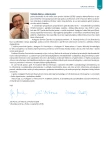From dyslipidemia to ischemic heart disease and vice versa
Authors:
Jan Piťha
Authors‘ workplace:
Laboratoř pro výzkum aterosklerózy Centra experimentální medicíny IKEM, Praha
; Interní klinika 2. LF UK a FN v Motole, Praha
Published in:
AtheroRev 2016; 1(3): 120-124
Category:
Reviews
Overview
To halt the progression and inducing regression of atherosclerosis it is necessary to reduce LDL-cholesterol to levels less than 1.3 mmol/l. This can be achieved with high doses of active statins, inhibitors of proprotein convertase subtilisin/kexin 9, LDL/Lp(a) apheresis, or by combination of these methods. The latter two methods are the only substantially reducing other important lipid risk factor, lipoprotein(a). Triglycerides and HDL cholesterol can be improved mainly by lifestyle ganges.
Key words:
atherosclerosis – diagnosis-management – dyslipidemia – ischemic heart disease
Sources
1. Informace dostupné z WWW: <http://www.uzis.cz/katalog/rocenky/zdravotnicka-rocenka-ceske-republiky>.
2. Berenson GS, Srinivasan SR, Bao W et al. Association between multiple cardiovascular risk factors and atherosclerosis in children and young adults. The Bogalusa Heart Study. N Engl J Med 1998; 338(23): 1650–1656.
3. Gidding SS, Rana JS, Prendergast C et al. Pathobiological Determinants of Atherosclerosis in Youth (PDAY) Risk Score in Young Adults Predicts Coronary Artery and Abdominal Aorta Calcium in Middle Age: The CARDIA Study. Circulation 2016; 133(2): 139–146. Dostupné z DOI: <http://dx.doi.org/10.1161/CIRCULATIONAHA.115.018042>.
4. Chambless L, Keil U, Dobson A et al. Population versus clinical view of case fatality from acute coronary heart disease: results from the WHO MONICA Project 1985–1990. Multinational MONItoring of Trends and Determinants in CArdiovascular Disease. Circulation 1997; 96(11): 3849–3859.
5. Dutta P, Courties G, Wei Y et al. Myocardial infarction accelerates atherosclerosis. Nature 2012; 487(7407): 325–329. Dostupné z DOI: <http://dx.doi.org/10.1038/nature11260>.
6. Varbo A, Nordestgaard BG. Remnant cholesterol and ischemic heart disease. Curr Opin Lipidol 2014; 25(4): 266–273. Dostupné z DOI: <http://dx.doi.org/10.1097/MOL.0000000000000093>.
7. Kostner KM, März W, Kostner GM. When should we measure lipoprotein (a)? Eur Heart J 2013; 34(42): 3268–3276. Dostupné z DOI: <http://dx.doi.org/10.1093/eurheartj/eht053>.
8. Blankenhorn DH, Nessim SA, Johnson RL et al. Beneficial effects of combined colestipol-niacin therapy on coronary atherosclerosis and coronary venous bypass grafts. JAMA 1987; 257(23): 3233–3240.
9. Blankenhorn DH. Regression of atherosclerosis: what does it mean? Am J Med 1991; 90(2A): 42S-47S.
10. Cashin-Hemphill L, Mack WJ, Pogoda JM et al. Beneficial effects of colestipol-niacin on coronary atherosclerosis. A 4-year follow-up. JAMA 1990; 264(23): 3013–3017.
11. Blankenhorn DH. Progression and regression of human femoral atherosclerosis.Trans Assoc Life Insur Med Dir Am 1980; 63: 109–120.
12. Blankenhorn DH, Azen SP, Kramsch DM et al. [MARS Research Group]. Coronary angiographic changes with lovastatin therapy. The Monitored Atherosclerosis Regression Study (MARS). Ann Intern Med 1993; 119(10): 969–976.
13. Puri R, Nissen SE, Somaratne R et al. Impact of PCSK9 inhibition on coronary atheroma progression: Rationale and design of Global Assessment of Plaque Regression with a PCSK9 Antibody as Measured by Intravascular Ultrasound (GLAGOV). Am Heart J 2016; 176: 83–92. Dostupné z DOI: <http://dx.doi.org/10.1016/j.ahj.2016.01.019>.
14. Ornish D, Scherwitz LW, Billings JH et al. Intensive lifestyle changes for reversal of coronary heart disease. JAMA 1998; 280(23): 2001–2007. Erratum in: JAMA 1999; 281(15): 1380.
15. Boekholdt SM, Hovingh GK, Mora S et al. Very low levels of atherogenic lipoproteins and the risk for cardiovascular events: a meta-analysis of statin trials. J Am Coll Cardiol 2014; 64(5): 485–494. Dostupné z DOI: <http://dx.doi.org/10.1016/j.jacc.2014.02.615>.
16. Reiner Z, Catapano AL, Backer G et al. ESC/EAS Guidelines for the management of dyslipidaemias: the Task Force for the management of dyslipidaemias of the European Society of Cardiology (ESC) and the European Atherosclerosis Society (EAS). Eur Heart J 2011; 32(14): 1769–1818. Dostupné z DOI: <http://dx.doi.org/10.1093/eurheartj/ehr158>.
17. Cannon CP, Blazing MA, Giugliano RP et al. [IMPROVE-IT Investigators]. Ezetimibe Added to Statin Therapy after Acute Coronary Syndromes. N Engl J Med 2015, 372(25): 2387–2397. Dostupné z DOI: <http://dx.doi.org/10.1056/NEJMoa1410489>.
18. Awan Z, Baass A, Genest J. Proprotein convertase subtilisin/kexin type 9 (PCSK9): lessons learned from patients with hypercholesterolemia. Clin Chem 2014; 60(11): 1380–1389. Dostupné z DOI: <http://dx.doi.org/10.1373/clinchem.2014.225946>.
19. Robinson JG, Kastelein JJ. PCSK9 Inhibitors and Cardiovascular Events. N Engl J Med 2015; 373(8): 774.
20. Hoover-Plow J, Huang M. Lipoprotein(a) metabolism: potential sites for therapeutic targets. Metabolism 2013; 62(4): 479–491. Dostupné z DOI: <http://dx.doi.org/10.1016/j.metabol.2012.07.024>.
21. Tuteja S, Rader DJ. High-density lipoproteins in the prevention of cardiovascular disease: Changing the paradigm. Clin Pharmacol Ther 2014; 96(1): 48–56. Dostupné z DOI: <http://dx.doi.org/10.1038/clpt.2014.79>.
Labels
Angiology Diabetology Internal medicine Cardiology General practitioner for adultsArticle was published in
Athero Review

2016 Issue 3
Most read in this issue
- Arterin® – doplněk stravy v léčbě dyslipidemie: výsledky krátkodobého klinického sledování
- Atherogenic dyslipidemia – a new target in cardiovascular prevention
- Peripheral arterial disease (PAD) of lower extremity and dyslipidemia
- Proprotein convertase subtilisin/kexin type 9 (PCSK9) inhibitors
